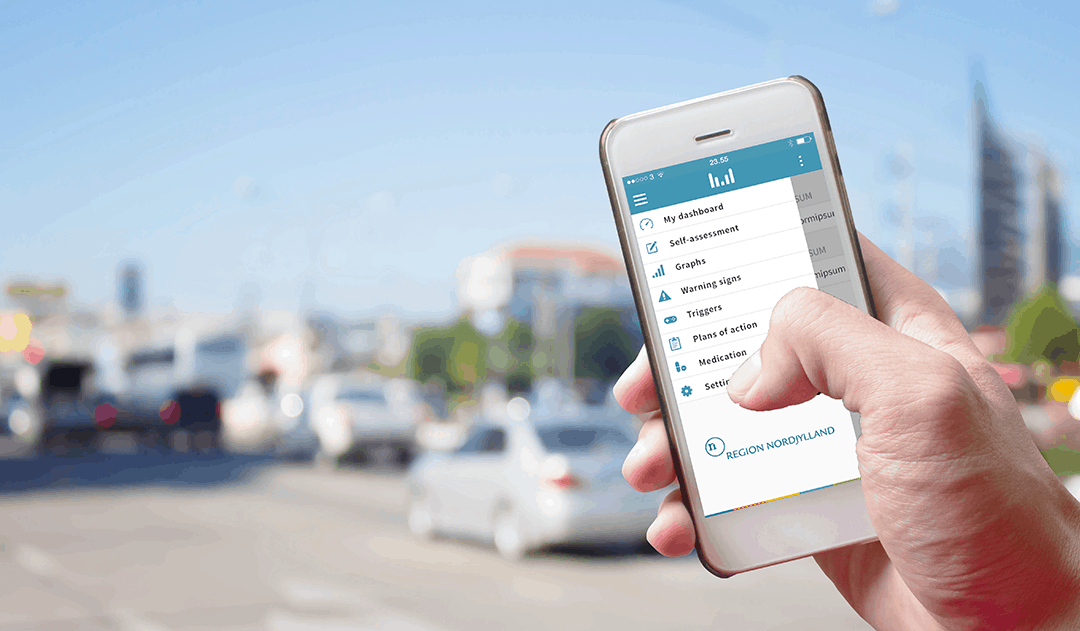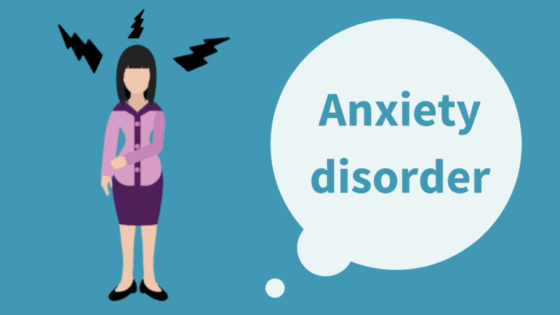
by Thomas Lethenborg | Jan 26, 2016 | Anxiety, News
Monsenso will begin clinical trials to support the treatment of anxiety disorder in collaboration with The Mental Health Services in the Region of Southern Denmark (MHS).
The Anxiety Monitoring Study
The objective of the study is to implement and validate the Monsenso mHealth solution to support the treatment of anxiety disorders.
The Monsenso mHealth platform uses a double-loop treatment model to connect care providers and individuals. Currently, it is being used to collect patients’ self-rated status and sensor-based behavioural data on a daily basis.
Recent advances in mobile technologies have created more opportunities for assessments and treatments to be available to people in situations where they are most needed. Personal health technologies can collect patients’ self-rated status and sensor-based behavioural data (e.g., physical activity, phone usage, social activity) on a daily basis.
The information gathered this way provides feedback on treatment progress to both care providers and individuals. Moreover, it also supplies ecological momentary interventions (EMI), for instance, by prompting individuals to do assignments depending on the context and patients’ current status.
Regarding anxiety disorders, mobile health solutions can be useful in assisting patients to use skills learned during treatment in real life situations, as well as to monitor and give feedback on progress or lack of progress during therapy. This feedback leads to better outcomes for patients not responding well to treatment.
Pilot study: The feasibility of the solution will be evaluated using a qualitative and quantitative study without a control group involving 30 patients for three months examining usability and usefulness of the solution for both patients and clinicians.
Participants: Anxiety Patients in Routine and Special Care Settings in Southern Denmark.
Expected results: The study will result in the development of a solution based on user needs. The platform will be a feasible, usable and useful intervention.
Implementation: If the results of the feasibility study are promising, the study results will be used to improve the mHealth solution and develop version 2. Afterwards, a randomised controlled trial (RCT) will be conducted to examine outcome related effects of the solution, such as rate of recovery. If the feasibility and outcome of the RCT studies are positive, it is expected that there will be interest in implementing the mHealth solution in routine and specialized care settings around the world.
To read the press release, click here.

by Thomas Lethenborg | Nov 3, 2015 | Anxiety
Experiencing occasional anxiety is a normal part of life. However, people with anxiety disorders frequently have intense, excessive and persistent worry and fear about everyday situations. Often, anxiety disorders involve repeated episodes of sudden feelings of intense anxiety and fear or terror that reach a peak within minutes (panic attacks) [1].
Anxiety is the primary symptom of several conditions, including:
- Generalized anxiety disorder (GAD)
- Panic attacks
- Phobias
- Post-traumatic stress disorder
- Social anxiety disorder [2]
- Symptoms of GAD
- Restlessness
- Sense of dread
- Feeling constantly “on edge”
- Difficulty concentrating
- Irritability
- Dizziness
- Tiredness
- Fast or irregular heartbeat
- Muscle aches and tension
- Trembling or shaking
- Shortness of breath
- Headache
- Insomnia [2]
The two main treatments for anxiety disorders are psychotherapy and medication. It is often beneficial to combine both. It may take some trial and error to discover which treatments work best for an individual.
Psychotherapy
Psychotherapy, also known as talk therapy or psychological counselling, involves working with a therapist to reduce a person’s anxiety symptoms. Sometimes, it can be an effective treatment on its own [3].
Cognitive behavioural therapy (CBT) is one of the most effective forms of psychotherapy for anxiety disorders. A short-term treatment, cognitive behavioural therapy focuses on teaching individuals specific skills to return gradually to the situations they avoided due to their anxiety [3].
Applied relaxation focuses on relaxing your muscles in a particular way during situations that usually cause anxiety. The technique needs to be taught by a trained therapist, but involves:
- Learning to relax one’s muscles
- Learning to relax one’s muscles quickly and in response to a trigger, such as the word “relax”
- Relaxing one’s muscles in situations that make a person anxious [2]
Medication
- Antidepressants – this type of medications influences the activity of brain chemicals (neurotransmitters) thought to play a role in anxiety disorders
- Buspirone – an anti-anxiety medication called buspirone may be used on an ongoing basis. As with most antidepressants, it typically takes up to several weeks to become fully effective
- Benzodiazepines – this type of medication are used only for relieving acute anxiety on a short-term basis. Because they can be habit-forming, these medications aren’t a good choice if you’ve had problems with alcohol or drug abuse [1]
The Monsenso mHealth solution for behavioural disorders is currently being used to support the treatment of individuals suffering from bipolar disorder, schizophrenia, depression, and borderline personality disorder.
Although there isn’t any ongoing research on anxiety, it can definitely be used to support the treatment of anxiety with in conjunction with CBT.
Individuals can obtain an overview of their historic levels of anxiety and try to identify the behavioural patterns that trigger their symptoms. Based on their historical records they can learn to predict situations of risk and take preventive measures to avoid or minimize any adverse reactions. Additionally, the Monsenso smartphone app also provides individuals with customized action plans and a secure communication channel with their clinic when they need it the most.
References:
[1] Anxiety. Mayo Clinic.
http://www.mayoclinic.org/diseases-conditions/anxiety/basics/definition/con-20026282
[2] Anxiety. National Institute of Mental Health.
http://www.nimh.nih.gov/health/topics/anxiety-disorders/index.shtml
[3] Anxiety. National Health Service (NHS) UK
http://www.nhs.uk/conditions/anxiety/Pages/Introduction.aspx




